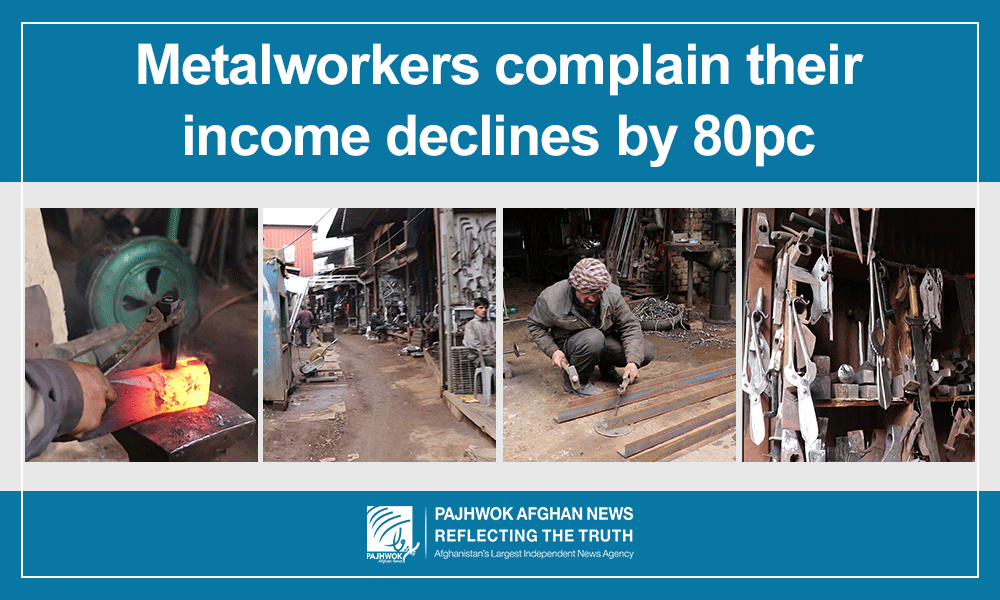KABUL (Pajhwok): Metalworkers in capital Kabul say imports of metal products at lower rates to the country have badly affected their business.
In Kucha-i-Ahangari area in Qwa-i-Markaz locality of Kabul, 150 blacksmiths work in 30 shops and each has decades of experience in the profession.
In each shop, about five people are engaged in making iron tools such as scissors, axes, knives, sickles, saws and others.
Blacksmiths who work in old shops are complaining about declining incomes and economic problems and they are worried that many of them will lose their businesses if the situation continues.
Frogh Tareen, a Pajhwok Afghan News reporter talked with many metalworkers about their businesses in Kabul.
All blacksmiths in Kucha-i-Ahangari area are busy and the noise of their work makes it hard for people to hear each other.
Esmatullah, an elderly man who has worked for more than two decades as blacksmith, complained to Pajhwok Afghan News about the decline of their business.
However, he is still hopeful and says that his business would flourish again.
“Thanks to peace and tranquility that has come to our country, we hope in God, everything will gradually improve and our business would also flourish,” he said.
Esmatullah asked the government to support them and provide metalworkers with raw materials.
Mohammad Nawab, a man who has been making iron objects for 10 years in the area said, “Our business has declined since the new government was established, we cannot even hire trainees, we want the government to support us and find markets for our products.”
He said that he was unable to pay the rent of his shop for six months due to his low income.
“Our business has collapsed, we sell our products at lower prices while the prices of raw materials and coal is high, lack of electricity is another major problem,” he said.
Hassan Sarwari, head of Blacksmiths Union, said that the blacksmithing industry in Afghanistan has a long history.
“The blacksmithing industry in Afghanistan has been severely affected by more than four decades of war and metalworkers are not in good condition,” he said.
He said that imports of similar products with lower quality and their cheap prices had severely affected the blacksmithing industry at home and even faced it with collapse.
“Foreign products that are imported to Afghanistan are produced by machines and have very poor quality, we produce things with our hands which have very high quality,” he said.
Sarwari said that the prices of imported metal products were 40 to 60 percent cheaper, which affected the metalworking sector in the country.
“We met with former presidents Hamid Karzai and Ashraf Ghani, as well as Dr. Abdullah Abdullah, former chairman of High Council of National Reconciliation, for solving our problems and prevention imports of similar products from abroad, they promised that they would buy our products 25 percent higher than imported products, but they did not do so and the import of foreign products continued,” he said.
About the monthly income of metalworkers, he said that their income has declined by over 80 percent.
Sarwari said that previously they had 380 workshops in the union but their number had reduced to 115.
He hoped the situation would improve in the coming spring and the metalworking industry would regain its market.
Sarwari said that the incumbent government has also promised to support blacksmiths, but it did nothing so far.
MaulanaZuhair, spokesman for the Ministry of Commerce and Industry, told Pajhwok that they had reached an agreement with the Ministry of Finance and Chamber of Shopkeepers and Craftsmen to increase tax on import of products which are also produced domestically.
mds/ma







GET IN TOUCH
NEWSLETTER
SUGGEST A STORY
PAJHWOK MOBILE APP